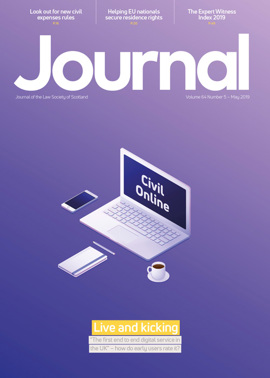Vulnerable accused: a need for knowledge

The public’s perception of what takes place in a court is perhaps largely influenced by fictional drama. The reality for most of those appearing in court in any capacity is of an unfamiliar environment where understanding the language, processes and procedures is challenging.
For the vulnerable person, this is only made more difficult. For the vulnerable accused person, they will need to understand, plead, instruct their agent (if represented), question the evidence and, if convicted, put forward mitigation for sentence. Respect for that vulnerable accused person’s human rights is fundamental in ensuring fairness and transparency. How well the Scottish criminal justice system copes with that vulnerable accused person depends on various factors including where they live, and their familiarity with and knowledge of the criminal justice system.
Recognising that with the Vulnerable Witnesses (Criminal Evidence) (Scotland) Bill currently progressing through the Scottish Parliament, those accused were receiving less policy development attention than vulnerable witnesses, in November the Law Society of Scotland held a round table event to consider vulnerable persons within the criminal justice system, focusing on the vulnerable accused. This was attended by practitioners, representatives from criminal justice organisations, third sector groups involved with vulnerable accused persons and Scottish Government policy officials.
Five point plan
The event considered issues with identification and support for the vulnerable accused person. All agreed that more could be done without necessarily needing new legislation. It was especially welcome and important to hear views expressed from third sector organisations representing the interests of and providing support for some of the most vulnerable in our society.
Our report on vulnerable accused persons is now published, making the following five recommendations:
- Development of a framework of understanding to be shared across the Scottish criminal justice system, following a multi-agency review of definitions and interpretations of vulnerability.
- A review of existing legislation, measures and practices, including ongoing consultations, in relation to vulnerable persons, leading to the development of a central portal of knowledge and information.
- A review of groups for whom there is limited support and representation within the Scottish criminal justice system.
- A review of the prevalence of individuals with vulnerabilities in the Scottish criminal justice system, and the types of vulnerabilities most commonly encountered.
- A review of how the use of existing and innovative technology can better support information sharing and data protection.
Who are the vulnerable?
The event encouraged the articulation of issues being faced by vulnerable accused persons and how to address them. There are many examples of existing good practice, but sharing these effectively and considering what more can be done is essential if the system is to improve.
What do we mean by vulnerability? It means something different depending on previous experience, specialist knowledge or unconscious bias. There needs to be a greater understanding of vulnerability for all, which provides an opportunity for the third sector to contribute expertise. Those involved in the criminal justice organisations can then be informed and adapt practices and procedures to support the vulnerable person accused.
Identifying the vulnerable accused person at the earliest opportunity would fundamentally benefit the criminal justice system. It would save on delays in court or opportunities where unfairness may arise as a consequence of any failure to identify. There are of course practical issues to consider here, however – the first engagement may be a court appearance when answering a complaint.
Active engagement
There are groups that have traditionally been underrepresented in the criminal justice forum. Undertaking specific work to focus on such a group by assessing, considering and improving their experience in court may provide examples of good practice as a basis for other groups to consider. An example to explore may lie in the changing age profile of those appearing before a court. We understand that the age of those appearing in court is increasing, whether as a witness or as accused, but how do age and vulnerability interact?
Problems of language, processes and procedures in the criminal justice system are the same for all vulnerable people. Those working within the system need to listen to those groups to help adapt flexible approaches and practices by being better informed. As deafscotland said: “Only their actively being involved in the development work will help Scotland lead the way in fairness and inclusive practices.”
Our recommendations include roles for everyone – there are some issues we can take forward ourselves, some may be best taken forward by Government, and there will be many opportunities for anyone with the knowledge and interest to engage.
In this issue
- Claiming under the advance payment scheme
- Time for a written constitution
- New form F9: worth the wait?
- Wedded to a matrimonial property regime
- Brexit divorce set to increase UK's “skype families”
- Corporate personality: Justice v Doctrine
- Reading for pleasure
- The Law Society of Scotland Expert Witness Index 2019
- Opinion: Judith Robertson
- Book reviews
- Profile: Michael Clancy
- President's column
- Is your legal data being held to ransom?
- People on the move
- Sign up – log in – action!
- Frozen out?
- Taxing times for litigators
- DNA analysis: when research just isn’t enough
- Brexit focus: EU citizen settlement remedies
- Why employers should report on wellbeing
- 3% – and then what?
- 1,000 days of mediation
- Barred from acting
- To name or not to name?
- Enter the “What I Think”
- Fixed penalties and fair trials
- Auto-enrolment: keeping employers on their toes
- Scottish Solicitors' Discipline Tribunal
- Vulnerable accused: a need for knowledge
- Burdens and who can enforce them
- Convener’s final bow
- Public policy highlights
- TCSP review update
- Westminster: answering the call
- Accredited paralegal practice area highlight: family law
- Accredited Paralegal Committee profile
- Nyona named star paralegal
- Ask Ash
- Moving nightmares part 2
- Complaints: seeking consistent practice
- Morally bankrupt?
- For the elderly: how SFE works
- Standing up to challenge






